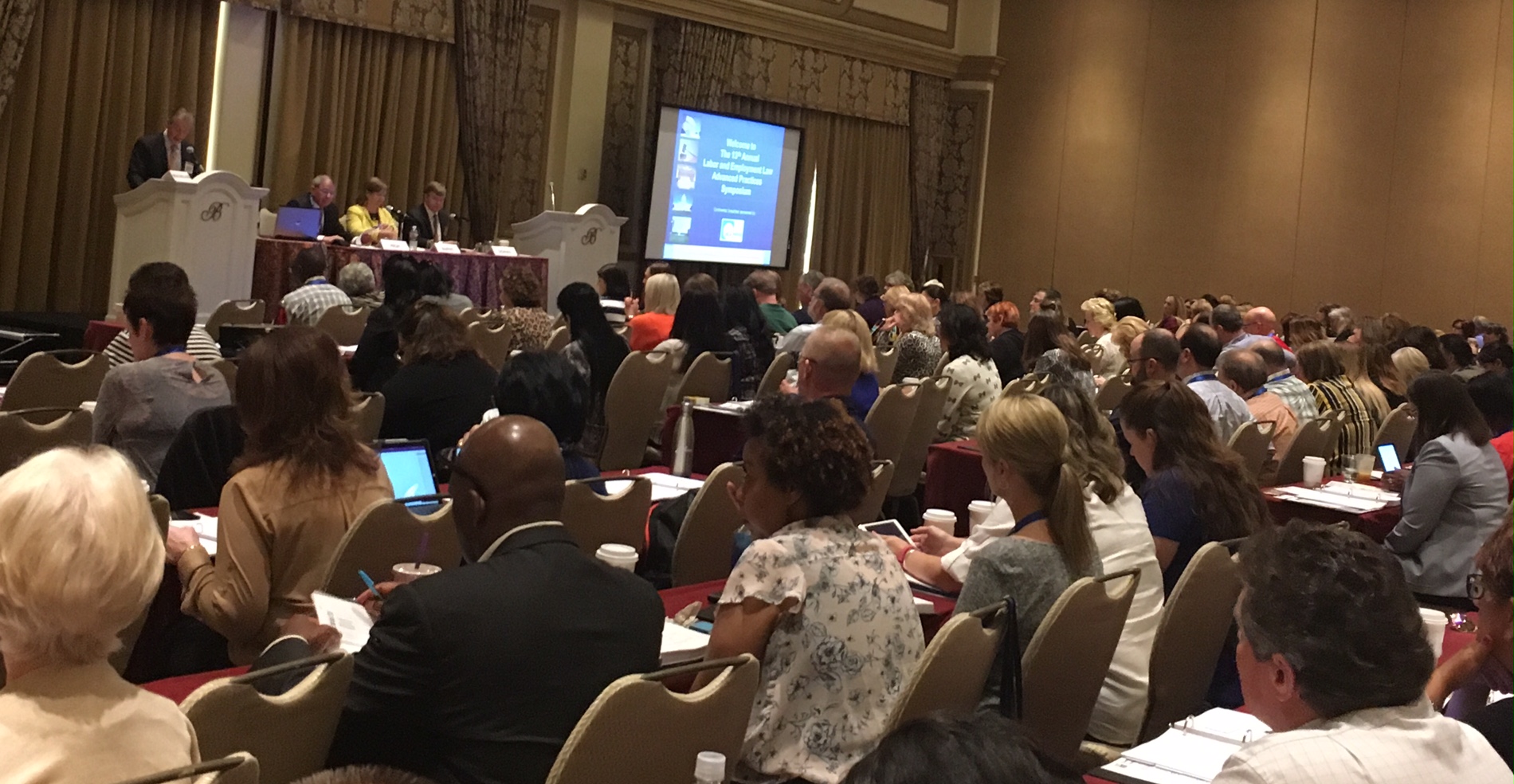
A record crowd of HR professionals descended on Bellagio in Las Vegas from March 29 to 31 to soak up employment law advice from more than two dozen of America’s finest employment lawyers at the 13th annual Labor & Employment Law Advanced Practices (LEAP) Symposium. Here are 17 pearls of wisdom from this year’s LEAP presenters. (Note: You can register for next year’s event at www.LEAP2018.com.)
1. Firings Take a day to think before terminating
“If immediate action is called for, employees should be sent home and told to report to the personnel office the next day, rather than be discharged on the spot … and employees should be given the opportunity to explain any mitigating circumstances.” – Paul Trimmer, Jackson Lewis, Las Vegas
* * *
2. F M L A Train managers on their duties
“I can’t think of another statute that requires more from employers and excuses less than the FMLA. It puts a lot of burdens on employers. And that’s why your biggest mistake is the failure to train your managers on how to comply.” – Bob Sheeder, Bracewell & Giuliani, Dallas
* * *
 3. Immigration Trump’s ‘virtual wall’ includes employers
3. Immigration Trump’s ‘virtual wall’ includes employers
“Most of the news on increased immigration enforcement is on travel bans and deportations. But the new administration will want employers to be a partner in their efforts, too. So now, more than ever, it’s important for every employer to make sure their I-9 paperwork is in compliance.” – John Fay, LawLogix, Phoenix
* * *
4. Documents Play it safe with retention deadlines
“When a retention period says to keep a document for two or three years, I’d suggest you keep it for the current year plus two to three years, just so you can be sure someone doesn’t destroy it too early.” – Rick Roskelley, Littler, Las Vegas
* * *
5. Retaliation Juries find retaliation cases to be believable
“Retaliation cases are the most plentiful claims and some of the hardest to defend because they’re believable. They resonate with juries … Nature takes over because when you get accused of something, it’s natural to lash out at your accuser.” – George Yund, Frost Brown Todd, Cincinnati
* * *
6. Employees How to classify ‘gig economy’ workers
“If a person isn’t a volunteer or intern, then, under current law, they have to be an employee or independent contractor. But no one knows yet where to fit in ‘gig economy’ workers, like Uber drivers. Some are arguing that we need a third, separate classification for these people.” – Charlie High, Kemp Smith, El Paso, TX
* * *
7. Discr imination Audit your salaries for gender bias
imination Audit your salaries for gender bias
“Publicity about the gender pay gap has been in the news a lot lately. And what’s in the news becomes what’s on employees’ minds when they come to work looking for evidence. Audit your pay now to identify disparities before a government or litigation force you to.” – attorney Kathy Perkins, Lawrence, KS
* * *
8. Policies Avoid blemishes on your tattoo rules
“Most employers with tattoo policies are saying ‘no visible tattoos.’ I’ve seen some that say no visible offensive tattoos. But you don’t want to be in the business of deciding what’s offensive and what’s not, so it’s best to stick with ‘no visible tattoos.’” – C.B. Burns, Kemp Smith, El Paso, TX
* * *
9. State laws Blue states pushing their own workplace agenda
“We’re going to see an outbreak of legislation this year coming from blue states and blue cities than run counter to what’s happening in Washington. They’ll be pursuing issues like paid leave and pro-union initiatives.” – Paul Prather, Littler, Memphis
* * *
10. Unions ‘Ambush elections’ add new pressure on employers
“Since the ambush election rules took effect in 2015, the average time to a union election is 24 days, down from 38 days before. The speed is so fast that it’s taking a herculean effort by the business to defeat elections these days.” – David Rittof, Modern Management, Chicago (Note: Unions are winning about 72% of workplace elections these days, which is relatively unchanged from the 71% win rate  before the ambush election rules took effect.)
before the ambush election rules took effect.)
* * *
11. Lawsuits Use your outside attorney as a lifeline, not a last resort“I’m far more effective and cost-efficient being your counselor than your litigator. It’s always wiser to pick up the phone with a question instead of going too far down a hole and hiring me to defend you in a lawsuit.” – John Doran, Sherman & Howard, Phoenix
* * *
12. Discipline Civility and kindness count
“There are ways to discipline and terminate people without triggering drama or legal trouble, and it all comes down to civility. A good motto is ‘Be hard on the problem, but soft on the people.’ Kindness counts.” – Jeff Portnoy, Cades Shutte, Honolulu
* * *
13. Handbooks Do arbitration pacts encourage more legal claims?
“Some people say that requiring arbitration will actually encourage employees to pursue complaints against a company because it is easier. That’s a myth. My experience over the years is the opposite. With arbitration, employees won’t see a money tree to shake, so they won’t take a complaint to the next level.” – John Doran, Sherman & Howard, Phoenix
 * * *
* * *
14. Policies Use ‘bad news’ event as teaching moment for employees
“It’s a good idea that when something bad happens in other workplaces, like a high-profile violence event, HR should use that opportunity to remind employees about their policies and procedures.” – Dr. Dennis Davis, Ogletree Deakins, Torrance, CA
* * *
15. Safety OSHA moves from enforcement to assistance
“During the Obama administration, OSHA really ramped up with increased enforcement and penalties. You’ll see a rollback of that under the Trump administration and a much bigger focus on compliance assistance.” – Steve Suflas, Ballard Spahr, Denver
* * *
16. Tough talks One word to avoid in your documentation
“Don’t use the word ‘attitude’—as in ‘Mike has a bad attitude’—when documenting employee behavior or even when counseling an employee. It’s a matter of opinion and courts will throw it out. Always be specific and use examples.” – author and former HR exec Paul Falcone
* * *
17. I-9 forms Beware the ‘green card trap’
“In terms of I-9 documentation risk factors, green cards are the big one … The issue that comes up over and over is when HR specifically asks for green cards from lawful permanent residents. Those employees can show you a drivers’ license or other documentation. So don’t specifically ask for a green card. It’s one of the biggest misconceptions.” – John Fay, LawLogix, Phoenix
